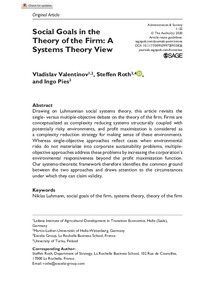Social Goals in the Theory of the Firm: A Systems Theory View
Pies I.; Roth S.; Valentinov V.
https://urn.fi/URN:NBN:fi-fe2021042825247
Tiivistelmä
Drawing on Luhmannian social systems theory, this article revisits the single- versus multiple-objective debate on the theory of the firm. Firms are conceptualized as complexity-reducing systems structurally coupled with potentially risky environments, and profit-maximization is considered as a complexity reduction strategy for making sense of these environments. Whereas single-objective approaches reflect cases when environmental risks do not materialize into corporate sustainability problems, multiple-objective approaches address these problems by increasing the corporation’s environmental responsiveness beyond profit-maximization. Our systems-theoretic framework therefore identifies the common ground between the two approaches and draws attention to the circumstances under which they can claim validity.
Kokoelmat
- Rinnakkaistallenteet [19207]
